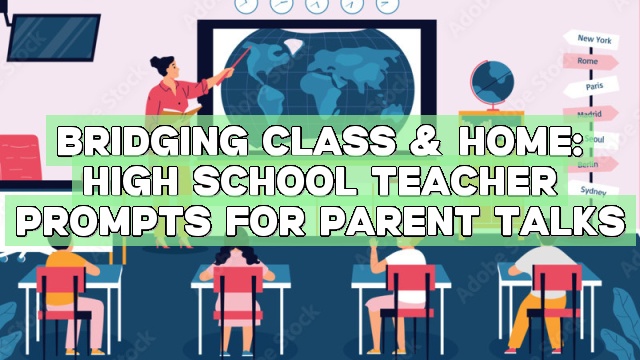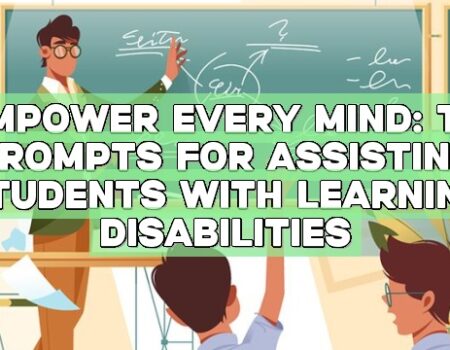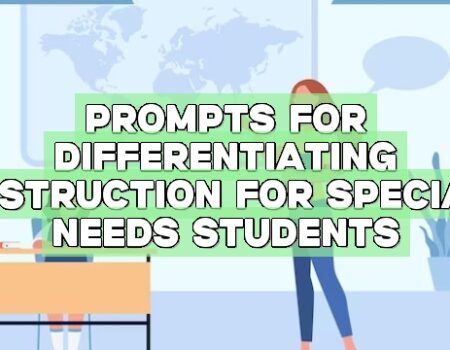High school is a crucial period in a student’s education, and effective communication between parents and teachers is essential to ensure success. Teachers play a vital role in facilitating this communication by using prompts that prompt parents to engage in conversations about their child’s progress, academic performance, and behavior.
Through these prompts, parents can gain insights into their child’s learning experience and collaborate with teachers to create a supportive environment for academic success. In this article, we will explore the benefits of high school teacher prompts for parent communication and provide practical strategies and sample prompts to enhance parent-teacher relationships.
Key Takeaways
- Effective communication between high school teachers and parents is critical for student success.
- Teacher prompts can facilitate productive parent-teacher conversations about academic progress, behavior, and goals.
- Using technology can streamline communication and enhance the effectiveness of teacher prompts.
- Organizing and documenting parent communication can help maintain accurate records and identify patterns over time.
- Encouraging ongoing parent involvement in high school can support student motivation and academic outcomes.
Why Parent Communication is Essential for High School Teachers
As high school teachers, effective communication with parents is crucial for ensuring student success. By involving parents in their child’s education, teachers can create a supportive learning environment that fosters academic achievement and personal growth. Regular communication with parents also provides teachers with valuable insights into their student’s strengths, weaknesses, and individual needs, enabling them to tailor their instructional approach accordingly.
However, maintaining effective parent communication can pose challenges for high school teachers. The busy schedules of both parties can make it difficult to find time for meaningful discussions, while differing perspectives and communication styles can lead to misunderstandings and conflicts. Nonetheless, the benefits of maintaining open lines of communication with parents make it an essential aspect of the teaching profession.
Through regular communication and collaboration between high school teachers and parents, students can receive the support and guidance they need to reach their full potential academically and personally. This collaboration leads to the creation of a supportive network that fosters student growth and success.
Why Parent Communication is Essential for High School Teachers.
The Benefits of Using Teacher Prompts for Parent Communication
Effective communication between high school teachers and parents is critical to academic success. One way to encourage these interactions is through the use of teacher prompts, which are pre-written messages designed to prompt conversations between parents and teachers about their child’s progress.
Using teacher prompts can lead to several benefits, including:
| Boost Student Success | By providing parents with timely and relevant information about their child’s academic performance, behavior, and goals, teacher prompts can help parents support and encourage their child’s learning and development. This involvement can improve student motivation and lead to better outcomes. |
|---|---|
| Enhance Communication | Teacher prompts can facilitate more effective communication between teachers and parents, helping to establish trust and collaboration. They provide a structured framework for conversations and minimize misunderstandings or confusion. |
| Encourage Parental Involvement | By providing parents with regular updates about their child’s progress, teacher prompts can encourage greater parental involvement in their child’s education. This involvement can lead to more meaningful engagement and support both at home and in school. |
The use of teacher prompts can also help teachers save time and effort in preparing for and conducting parent-teacher conferences. By prompting parents to address specific topics, teachers can focus their conversations and prepare targeted information.
Overall, teacher prompts can be a valuable tool for high school teachers looking to enhance communication and collaboration with parents to promote student success.
Essential Topics for High School Teacher Prompts
High school teacher prompts serve as a means of initiating parent-teacher communication, facilitating discussions on a wide range of topics that can impact student success. Below are some essential topics that high school teacher prompts can cover:
| Topic | Description |
|---|---|
| Academic Performance | Discussing a student’s progress in specific subjects and identifying areas that require further development. |
| Homework Completion | Providing updates on homework assignments, encouraging parents to support their child’s learning, and discussing any challenges or concerns. |
| Behavior | Reviewing a student’s conduct in school, identifying areas of improvement, and discussing strategies to address any issues. |
| Extracurricular Activities | Sharing information about extracurricular activities in which the student is involved, discussing its impact on academic performance, and highlighting opportunities for engagement. |
| Upcoming Events | Informing parents of upcoming events such as parent-teacher conferences, open houses, and school performances, encouraging attendance and participation. |
Addressing these essential topics through high school teacher prompts can provide a comprehensive understanding of a student’s progress and needs, leading to more targeted and effective support.
Sample High School Teacher Prompts for Parent Communication
Effective communication between high school teachers and parents can have a significant impact on student success. Here are some sample teacher prompts that can facilitate meaningful conversations:
- Academic Performance: “How do you feel your child is progressing in their classes? Are there any areas in which they may need extra support?”
- Homework Completion: “How much time does your child typically spend on homework each night? Do they seem to understand the material they are working on?”
- Behavior: “Are there any concerns you have regarding your child’s behavior in or out of the classroom? How can I support them in making positive choices?”
- Extracurricular Activities: “Are there any extracurricular activities that your child enjoys or excels in? How can I help them balance these activities with their academic responsibilities?”
- Upcoming Events: “What events or deadlines should I be aware of for your child? Do they have any upcoming tests, projects, or assignments?”
Using prompts like these can help foster open-ended discussions and encourage parental involvement and support at home. As you use these prompts, be prepared to listen actively, ask follow-up questions, and work collaboratively with parents to develop a plan for supporting their child’s success.
Strategies for Effective Parent Communication with Teacher Prompts
Effective communication between high school teachers and parents requires intentional effort and a clear plan. Teachers can utilize teacher prompts to ensure productive dialogue that promotes student success. Here are some key strategies to ensure effective parent communication with teacher prompts:
1. Be Clear and Concise
Teacher prompts should be clear and concise, outlining specific discussion points and goals. Avoid using jargon or ambiguous language that may confuse parents. Be transparent about the purpose of the communication and what outcomes you hope to achieve.
2. Empathize with Parents
Emphasize empathy in all communications with parents. Acknowledge the concerns and perspectives of parents, and be willing to listen to their input. This can build trust and foster productive relationships that benefit students in the long run.
3. Actively Listen
Active listening is another crucial strategy for effective parent communication. Give parents ample opportunities to speak and share their thoughts, and demonstrate that you are listening attentively. Use open-ended questions to encourage discussion and gather information that can inform teaching strategies.
4. Encourage Parent Feedback
Encourage parents to share their feedback and suggestions about their child’s progress. Be open-minded and willing to consider parent input, while maintaining professional boundaries. Ensure that parents know that their feedback is valued and constructive to the student’s academic and personal growth.
5. Follow-up Consistently
Following up consistently is an essential component of effective parent communication. Ensure that parents receive regular updates about their child’s academic performance, behavior, and other relevant information. Use teacher prompts to maintain dialogue and check in on student progress on a regular basis.
By employing these strategies, high school teachers can ensure effective communication with parents using teacher prompts. This will foster positive relationships and a supportive learning environment that can ultimately lead to student success.
Overcoming Barriers in High School Parent Communication
While effective communication with parents is essential for high school teachers, various barriers can hinder this process. By recognizing and addressing these challenges, teachers can establish positive relationships with parents, leading to improved student outcomes.
Language Barriers
For non-native English speaking parents, language barriers can prevent effective communication between teachers and parents. One solution is to provide translation services, either through a dedicated staff member or an online platform such as ChatGPT. Teachers can also provide written materials in multiple languages, ensuring that all parents can participate in discussions about their child’s education.
Time Availability
Parents’ busy schedules and work commitments can make it difficult to schedule meetings with teachers during traditional school hours. To overcome this barrier, teachers can offer flexible communication methods, such as phone or video conferences outside of school hours. They can also provide regular updates through online platforms, allowing parents to stay informed about their child’s progress at their convenience.
Differing Perspectives
Teachers and parents may have differing perspectives on their child’s academic performance or behavior. To address this communication barrier, teachers should approach conversations with empathy and active listening skills, seeking to understand the parents’ concerns and offering evidence-based feedback. Teachers can also provide parents with relevant resources, such as articles or research studies, to support their understanding of their child’s education.
Integrating Technology for Streamlined Parent Communication
Technology has transformed the way we communicate, and its integration in parent-teacher communication can lead to improved engagement and efficiency. By leveraging communication tools such as ChatGPT, high school teachers can streamline interactions and foster enhanced communication with parents.
Using technology can facilitate quick and convenient communication between teachers and parents, resulting in regular updates and feedback. Parents can receive timely alerts and notifications about their child’s academic progress, upcoming events, and other relevant information. Such methods can simplify communication, ensure consistency, and promote transparency.
The benefits of using technology in parent communication include faster responses, accessibility, and convenience. Teachers can use this technology to maintain records of communication with parents, ensuring that they have a comprehensive record of discussions and feedback. This record-keeping can help maintain an accurate history of interactions, tracks progress, and identify patterns.
Furthermore, using technology can help overcome time constraints as it eliminates the need for face-to-face meetings, which can be challenging to schedule. It can also benefit parents who may struggle with work schedules or other commitments. Such parents can access information about their child’s progress at any time, from any location, using their smartphone or computer.
Finally, the integration of technology can promote collaboration and engagement between teachers and parents. The use of communication technologies can provide opportunities for educators and parents to work together more closely and share more information, ultimately leading to better outcomes for students.
Best Practices for Managing Parent Feedback and Suggestions
In any parent-teacher relationship, feedback and suggestions from parents serve as valuable insights into a student’s progress. However, managing this input can be challenging for high school teachers. It is essential to handle feedback with care, balancing the need for responsiveness with professional boundaries. Here are some best practices for effectively managing parent feedback and suggestions:
- Listen actively – When a parent shares feedback or a suggestion, actively listen to the concerns and validate their input. It is essential to convey empathy and understanding, even if you don’t ultimately agree with their point of view.
- Respond in a timely fashion – Time is of the essence when it comes to feedback and suggestions. Respond to parent communication as soon as possible and provide updates on any changes or developments regarding the issue.
- Address problems constructively – When addressing concerns, use a positive and constructive approach. Provide context and evidence to support your response while also acknowledging the parent’s perspective.
- Implement changes when possible – If a suggestion has merit and can improve the student’s learning experience, consider implementing it. This demonstrates that you value the parent’s input and are committed to continuous improvement.
- Document communication – Keep records of communication with parents, including feedback and suggestions, to monitor progress and identify trends. This information can be used to inform future parent-teacher conferences and support the student’s academic journey.
By following these best practices, high school teachers can effectively manage feedback and suggestions while maintaining positive relationships with parents. Remember, feedback is an opportunity for growth and improvement, and a collaborative approach can lead to optimal outcomes for the student.
Tracking and Documenting Parent Communication
Keeping track of parent communication is essential for high school teachers to maintain accurate records and ensure effective follow-up. Documenting communication allows teachers to monitor progress, identify patterns, and demonstrate efforts to address concerns.
One effective way to track communication is by creating a log or spreadsheet that records the date, method of communication, and brief summary of the conversation. This log can also include any actions taken or follow-up required. By organizing this information systematically, teachers can easily refer to previous conversations and avoid redundant communication.
It is vital to maintain secure records of communication in compliance with school policies and data protection regulations. Teachers should ensure that hard copies or electronic files are encrypted, password-protected, and accessible only to authorized personnel.
Reviewing communication records regularly and analyzing patterns can provide insight into potential issues that need to be addressed. It can also shed light on effective communication strategies and areas that require more attention.
Overall, documenting and tracking parent communication is an important aspect of effective teaching. It enables teachers to monitor progress, identify patterns, and provide the best support possible for student success.
Encouraging Ongoing Parent Involvement in High School
Parent involvement is crucial to ensure high school students receive the support they need to succeed. Research shows that students whose parents are involved in their education achieve higher grades, have better attendance, and are more likely to graduate. Here are some effective strategies to encourage ongoing parental involvement in high school:
- Host parent-teacher conferences. These conferences allow parents to meet with teachers and discuss their child’s academic progress and any concerns. By providing ample notice and scheduling flexibility, schools can ensure that more parents can attend.
- Invite parents to school events and activities. This can range from attending school plays and sports events to participating in volunteer activities. These events offer parents an opportunity to engage with the school community and feel invested in their child’s education.
- Provide resources and support for parents. Offering workshops, seminars, and online resources on topics such as college readiness, financial aid, and career exploration can equip parents with the tools they need to support their child’s education.
- Communicate regularly with parents. Regular communication ensures that parents stay informed about their child’s academic progress, upcoming events, and any concerns. By using a variety of channels, including email, phone calls, and social media, schools can ensure that parents receive timely updates.
- Encourage parental involvement in decision-making. Schools can involve parents in decisions that affect their child’s education, such as developing school policies or choosing extracurricular activities. This level of involvement fosters a sense of ownership in the school and increases parental investment in their child’s education.
By implementing these strategies, high schools can create a collaborative and supportive learning environment that promotes student success. Encouraging ongoing parent involvement is essential to preparing students for college, career, and beyond.
Conclusion
High school teacher prompts for parent communication are essential for student success. By bridging the gap between home and school, parents are more involved in their child’s education, leading to improved academic performance. Effective communication between parents and teachers creates a supportive learning environment that encourages students to reach their full potential.
Throughout this article, we discussed the importance of parent communication for high school teachers and the advantages of using teacher prompts to facilitate dialogue. We provided essential topics that should be covered during parent-teacher discussions and sample prompts to guide conversations. We also discussed strategies for effective communication, including overcoming potential barriers and integrating technology to streamline interactions.
Managing parent feedback and tracking communication records are important practices that can help teachers and parents work together to support student success. Encouraging ongoing parent involvement in high school through workshops and other resources can also contribute to better academic outcomes.
By implementing the strategies and prompts discussed in this article, high school teachers can strengthen their relationships with parents and create a collaborative partnership that fosters student success.
Keywords: High School Teacher Prompts for Parent Communication, Student Success.
FAQ
Q: What is the significance of parent communication for high school teachers?
A: Parent communication is essential for high school teachers as it helps build a supportive learning environment and improves academic performance. It allows teachers to involve parents in their child’s education and helps address any challenges that may arise.
Q: What are the benefits of using teacher prompts for parent communication?
A: Teacher prompts facilitate effective dialogue between teachers and parents, allowing for discussions about student progress, behavior, and goals. They encourage parental involvement and support at home, leading to improved student success.
Q: What are some essential topics that high school teacher prompts can cover?
A: High school teacher prompts can cover topics such as academic performance, homework completion, behavior, extracurricular activities, and upcoming events. Addressing these topics ensures a holistic understanding of the student’s progress.
Q: Can you provide sample high school teacher prompts for parent communication?
A: Yes, here are some sample prompts:
– “How would you describe your child’s study habits at home?”
– “What strategies do you use to help your child stay organized?”
– “What are your child’s strengths and areas for improvement?”
These prompts can guide conversations and encourage open-ended discussions.
Q: What strategies can high school teachers use for effective parent communication with teacher prompts?
A: High school teachers can employ strategies such as clarity, empathy, and active listening to foster productive conversations. They can also utilize prompts to engage parents and build collaborative relationships.
Q: What are the potential barriers in high school parent communication?
A: Some common barriers include language barriers, limited time availability, and differing perspectives. Suggestions to overcome these barriers include using translation services and adopting flexible communication methods.
Q: How can technology be integrated for streamlined parent communication?
A: Technology can be used to streamline parent communication by using tools such as ChatGPT. These tools facilitate quick and convenient communication between teachers and parents, allowing for regular updates and feedback.
Q: What are the best practices for managing parent feedback and suggestions?
A: When handling parent feedback and suggestions, it is important to value and consider their input while maintaining professional boundaries. Effective response, addressing concerns, and implementing constructive suggestions can benefit the student’s education.
Q: Why is tracking and documenting parent communication important?
A: Tracking and documenting parent communication helps maintain an accurate history of interactions, track progress, and identify patterns. It assists in organizing and storing communication records securely and efficiently.
Q: How can high schools encourage ongoing parent involvement?
A: High schools can encourage ongoing parent involvement by offering activities, workshops, and resources that support parents in their active participation in their child’s education. Continued engagement leads to improved student motivation and academic outcomes.
Q: What is the importance of effective parent communication through teacher prompts for high school students?
A: Effective parent communication through teacher prompts is crucial for fostering student success in high school. It helps build bridges between home and school, creates a supportive learning environment, and improves academic performance.









